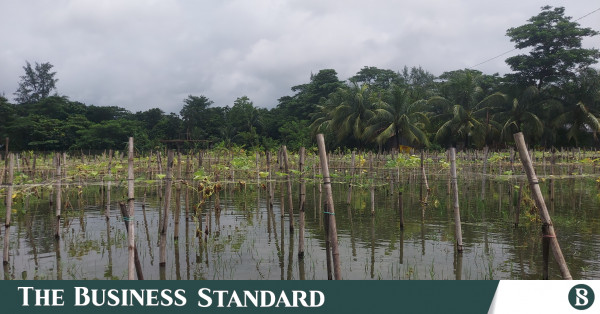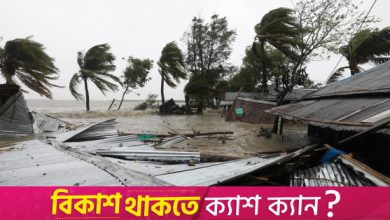Heavy rains, high tides cause southern farmers massive crop loss


Farmers in these areas are facing severe losses, as many have attempted to plant paddy seedlings multiple times, only to see them fail due to persistent waterlogging.
A paddy field in Lakshmipur inundated in heavy rainfall and unusually high tides. The flooding has devastated thousands of acres of Aman paddy seedlings and vegetable farms across several coastal districts in the southern region of the country. Photo: TBS
“>
A paddy field in Lakshmipur inundated in heavy rainfall and unusually high tides. The flooding has devastated thousands of acres of Aman paddy seedlings and vegetable farms across several coastal districts in the southern region of the country. Photo: TBS
Waterlogging caused by heavy rainfall and unusually high tides has devastated thousands of acres of Aman paddy seedlings and vegetable farms across several coastal districts in the southern region of the country.
Farmers in these areas are facing severe losses, as many have attempted to plant paddy seedlings multiple times, only to see them fail due to persistent waterlogging.
Locals attribute the problem to the lack of embankments in coastal areas and the widespread occupation of canals and rivers, which prevents rainwater from draining quickly, leading to waterlogging.
Farmers have expressed despair over the situation. They fear this could result in massive crop losses this year.
Last year, Aman paddy was cultivated on around 80,000 hectares of land in Lakshmipur. This year’s total cultivation data is yet to be logged.
Agricultural officials are currently assessing the damage and estimate crop damage on 50% to 60% of Aman paddy fields.
Lakshmipur Department of Agricultural Extension Deputy Director Sohel Mohammad Shamsuddin Firoz said they are assessing the extent of the damage and will report their findings to higher authorities for necessary actions.
“We are inspecting the fields to investigate the damage. Aman seedbeds and vegetable fields have been inundated in many areas. We will have accurate data by next Sunday,” he said.
Lakshmipur Sadar’s Bhabanganj and Tumchar, as well as Kamalnagar’s Char Martin unions, are known for paddy and vegetable cultivation.
However, a recent visit to Char Martin on the banks of the Meghna River revealed that many paddy seedbeds and vegetable fields were completely submerged.
One farmer, Mostafa Majhi, was seen trying to drain water from his Aman paddy seedlings by hand. His primary seedbed was destroyed due to waterlogging after the abnormal tides from 21-25 July.
“I then leased land elsewhere and sowed more seeds, but continuous rain submerged those seedlings as well. Now, after purchasing more seeds at a high cost, my third attempt was also ruined by recent rainfall,” he said, breaking down in tears.
Other farmers are facing similar struggles. Md Abdur Rashid from Char Ramni Mohan village said he had prepared seedling beds twice, but both were submerged due to excessive rain, leaving him with no paddy seeds left.
Haji Nur Mohammad, a farmer from Char Lorench village, said he had not seen such terrible waterlogging since the flood of 1998.
Local authorities, experts concerned
Dr Zakir Hossain, principal of the Noakhali Agriculture Training Institute, advised farmers to consider cultivating late-sown varieties of paddy or switching to vegetables and other crops once the water recedes.
“It is clear that there will be extensive damage to Aman crops this time. I am suggesting farmers cultivate a variety of paddy that can be sown late,” he said.
A local journalist, Abdul Rahman Biswas, noted that while tides in the past would rise briefly, this year saw an abnormally high tide that remained stationary for a week, causing widespread damage.
Azam Khan, a convener of the Dakatia River Protection Movement, highlighted that even high areas like Lakshmipur’s Raipur Upazila have been waterlogged for 15 consecutive days.
“There will hardly be any Aman paddy harvest in the district this year,” he said, blaming the situation on the illegal occupation of canals and rivers.
Several Union Parishad chairmen were unable to provide information about the crop damage.
Weather data from the Bangladesh Meteorological Department shows that the region has experienced significant rainfall, with 479 millimetres recorded between 21 and 31 July and an additional 272 millimetres recorded through 9 August.



